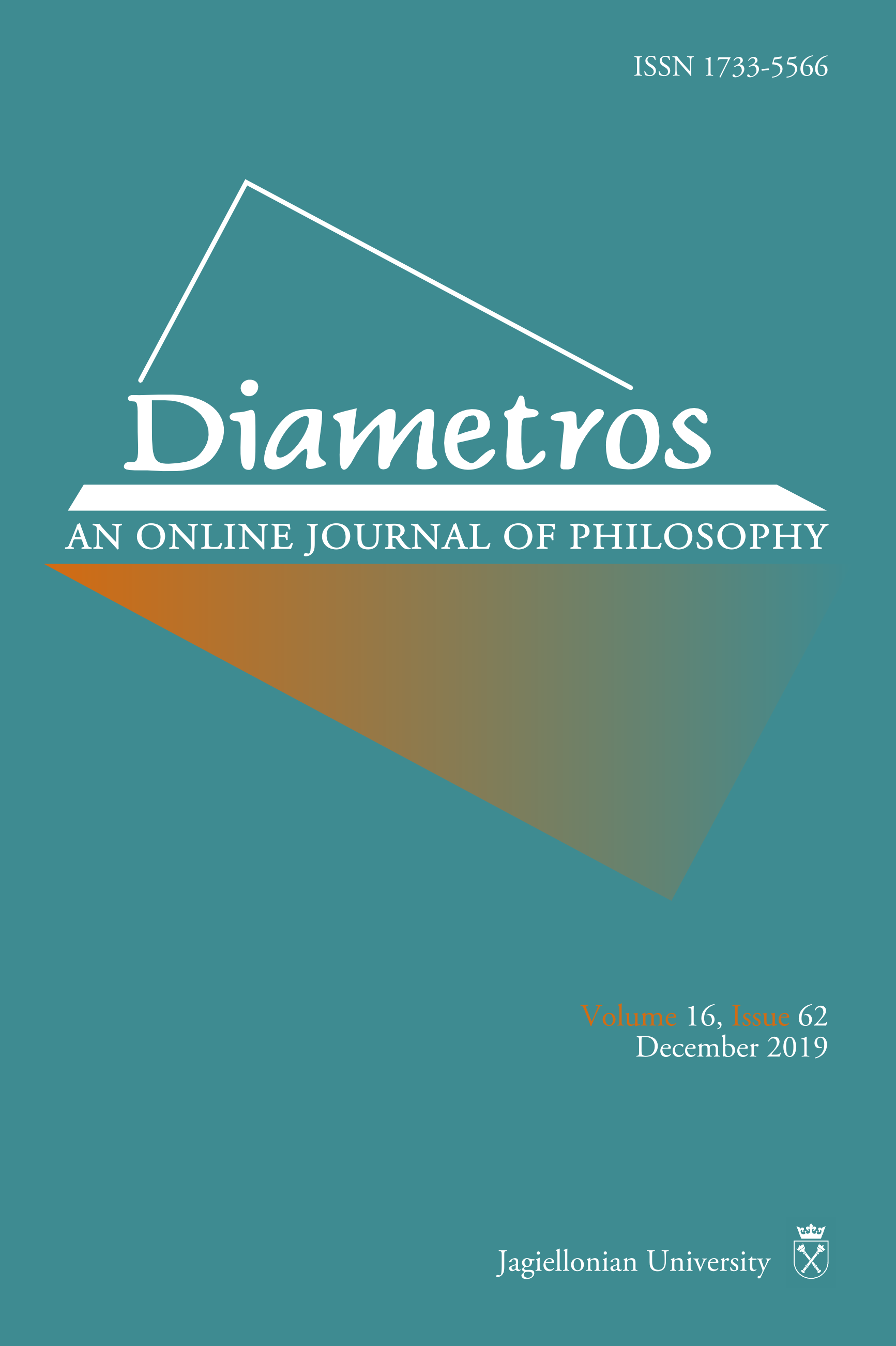What Is It Like To Be Immortal?
Main Article Content
Abstrakt
Article Details
Numer
Dział
Teksty zaproponowane do naszego czasopisma nie powinny być nigdzie publikowane przed ukazaniem się w „Diametros”. Wraz z przesłaniem swojego utworu redakcji autor akceptuje, że w momencie zakwalifikowania tekstu do publikacji czasopismo „Diametros” będzie stosowało licencję the Attribution 4.0 International (CC BY 4.0). Na podstawie tej licencji autorzy zgadzają się, że ich prace mogą być zgodnie z prawem ponownie wykorzystywane do jakichkolwiek celów bez konieczności uzyskania uprzedniej zgody ze strony autora lub wydawcy. Każdy może prace te czytać, pobierać, kopiować, drukować, rozpowszechniać oraz przetwarzać, pod warunkiem poprawnego oznaczenia autorstwa oraz oryginalnego miejsca publikacji. Autorzy zachowują prawa autorskie do swoich utworów bez żadnych innych ograniczeń. Pełna informacja na temat licencji CC BY: https://creativecommons.org/licenses/by/4.0/legalcode.
Jak cytować
Bibliografia
Altshuler, R. (2015), “Immortality, Identity, and Desirability,” [in:] Immortality and the Philosophy of Death, M. Cholbi (ed.), Rowman and Littlefield, Lanham (MD): 191-203.
Beglin, D. (2017), “Should I Choose to Never Die? Williams, Boredom, and the Significance of Mortality,” Philosophical Studies 174 (8): 2009-2028. DOI: https://doi.org/10.1007/s11098-016-0785-1
Beisecker, D. and Ulatowski, J. (Unpublished MS), “The Tedium of Immortality and the Exhaustion of Science,” University of Nevada, Las Vegas, 18pp.
Bortolotti, L. and Y. Nagasawa, (2009). "Immortality Without Boredom," Ratio 22 (3): 261-277. DOI: https://doi.org/10.1111/j.1467-9329.2009.00431.x
Bostrom, N. (2008), "Why I Want To Be A Posthuman When I Grow Up," [in:] Medical Enhancement and Posthumanity, B. Gordijn and R. Chadwick (eds), Springer, New York: 107-137.
Bruckner, D. (2012), "Against the Tedium of Immortality," International Journal of Philosophical Studies 20 (5): 623-644. DOI: https://doi.org/10.1080/09672559.2012.713383
Chalmers, D. (1996), The Conscious Mind, Oxford University Press, Oxford.
Chappell, T. (2007), "Infinity Goes Up On Trial: Must Immortality Be Meaningless?" European Journal of Philosophy 17 (1): 30-44. DOI: https://doi.org/10.1111/j.1468-0378.2007.00281.x
Fischer, J.M. (1994), "Why Immortality Is Not So Bad," International Journal of Philosophical Studies 2 (2): 257-270. DOI: https://doi.org/10.1080/09672559408570794
Fischer, J.M. (1997), "Death, Badness, and the Impossibility of Experience," Journal of Ethics 1 (4): 341-353. DOI: https://doi.org/10.1023/A:1009771331402
Gems, D. (2003), "Is More Life Always Better?" The Hastings Centre Report 33 (1): 31-39. DOI: https://doi.org/10.2307/3528378
Johnston, M. (2010), Surviving Death, Princeton University Press, Princeton.
Nagel, T. (1979), "What Is It Like To Be A Bat?" [in:] Mortal Questions, T. Nagel (ed), Cambridge University Press, Cambridge: 165-180.
Nussbaum, M. (1989). "Mortal Immortals: Lucretius on Death and the Voice of Nature," Philosophy and Phenomenological Research 50(2): 303-351. DOI: https://doi.org/10.2307/2107963
Paul, L.A. (2014), Transformative Experience, Oxford University Press, Oxford. DOI: https://doi.org/10.1093/acprof:oso/9780198717959.001.0001
Perry, J. (2001), Knowledge, Possibility, and Consciousness, The MIT Press, Cambridge (MA). DOI: https://doi.org/10.7551/mitpress/4077.001.0001
Preston, T. and S. Dixon. (2007), "Who Wants To Live Forever? Immortality, Authenticity, and Living Forever in the Present," International Journal for Philosophy of Religion 61 (1): 99-117. DOI: https://doi.org/10.1007/s11153-007-9114-0
Rosenberg, Jay. (2006), “Reassessing Immortality: The Makropulos Case Revisited,” [in:] The Good, The Right, Life and Death: Essays in Honor of Fred Feldman, K. McDaniel, J.R. Raibley, R. Feldman, and M.J. Zimmerman (eds), Ashgate Publishing Company, Burlington (VT): 227-240.
Scheffler, S. (2013), Death and the Afterlife, Oxford University Press, Oxford. DOI: https://doi.org/10.1093/acprof:oso/9780199982509.001.0001
Smith, B. (1997), “Realistic Phenomenology,” [in:] Encyclopedia of Phenomenology, L. Embree (ed.), Springer, Dordrecht: 586-590.
Steele, H. (1976), “Could Body-Bound Immortality Be Liveable?” Mind 85 (339): 424-427. DOI: https://doi.org/10.1093/mind/LXXXV.339.424
Williams, B. (1973), "The Makropulos Case: Reflections on the Tedium of Immortality," [in:] Problems of the Self, B. Williams (ed), Cambridge University Press, Cambridge: 82-100.
